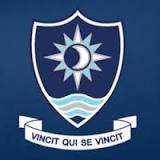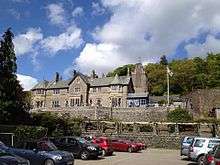Windermere School
 Crest of Windermere School | |
| Motto |
Vincit qui se vincit (One conquers who conquers oneself) |
|---|---|
| Established | 1863 |
| Type | Independent day and boarding school |
| Chairman of Governors | Michael Dwan |
| Founder | Elizabeth Hall and Catherine Sharpe |
| Location |
Patterdale Road Windermere Cumbria LA23 1NW United Kingdom Coordinates: 54°23′38″N 2°54′48″W / 54.3939°N 2.9133°W |
| DfE number | 909/6008 |
| Students | 400 (approx.) |
| Gender | Mixed |
| Ages | 2–18 |
| Houses | Cavendish, Flemyng, Lonsdale and Strickland (red, blue, green, yellow) |
| Colours | Navy and cyan |
| Former pupils | Stannites |
| Website |
www |
Windermere School is an independent, co-educational boarding and day school in the English Lake District. It has approximately 400 pupils between the ages of 2 and 18, a third of whom are boarders. Windermere Preparatory School caters for pupils up to the age of 11, after which they transfer to the senior department. Originally a girls' school, boys have been admitted since 1999. Windermere was previously known as 'St Anne's School, Windermere'. It is a member of Round Square and the Society of Headmasters & Headmistresses of Independent Schools. The Good Schools Guide describes Windermere as 'a school which revels in a hearty approach to everything from academia to friendships'.[1]
History
The school was founded in 1863 in the Lancashire coastal town of Lytham, by the young schoolmistresses Elizabeth Hall and Catherine Sharpe. Its first premises were rooms in Hall's parents' house, 'The Coppice', near the Lytham seafront. The school moved into its own house on Agnes Street two years later. It was named 'The School for the Accomplished', and catered for the daughters (and a few sons) of wealthy Lancashire industrialists. Hall and Sharpe later moved it to Belgrave House on St Anne's Road West in the new town of St Annes-on-Sea, two miles up the coast. Boy pupils were phased out during this time and the ever-expanding girls' school eventually moved again to a purpose-built house at 40, North Promenade, St Annes, in 1887, as 'St Anne's High School for Girls'.
The biggest upheaval came in 1924, when the school left Lancashire for the Browhead Estate in Windermere, Cumbria. The then vacant house had been acquired by joint headmistresses Helen Leigh and E.M. Morrison, possibly with financial assistance from Leigh's husband. The name was altered to 'St Anne's School, Windermere' and it has remained, and expanded, at Browhead ever since. The neighbouring estate of Elleray was acquired in 1944 to house the school's preparatory department.
Young boys had been educated at Elleray since the 1970s, and boys were finally admitted to the senior school in 1999. Boys now make up half the school roll across all ages.
The school's name was simplified to 'Windermere School' in 2010, at which point Elleray became 'Windermere Preparatory School'.
Headmistresses and Headmasters
- Catherine Sharpe (1863 - 1899)
- Elizabeth Hall (1863 - 1907)
- Helen Leigh (née Fulstow) (1899 - ?)
- E. M. Morrison (1907 - 1944)
- Vera Crampton (1944 - 1972)
- Michael Jenkins (1972 - 1996)
- Ross Hunter (1996 - 1999)
- Wendy Ellis (1999 - 2005)
- Allan Graham (2005 - 2010)
- Ian Lavender (2010–)
Curriculum
The National Curriculum is followed at all levels. Sixth form students may pursue the International Baccalaureate Diploma and the International Baccalaureate Careers Certificate.[2]
Estates
Browhead

The senior school is based at the Browhead campus — a wooded, fellside estate of 92 acres, a mile from the village of Windermere. At its heart is a large Victorian mansion, which houses the school's administrative centre, library, and girls' boarding accommodation on the upper floors. Crampton Hall was added in 1967. Other buildings on site include the Westmorland and Langdale boarding houses for sixth formers and boys respectively, a science complex, additional classrooms, Jenkins Centre (for the music, performing arts and languages departments, plus dining hall and kitchens), the art and technology department at South Lodge, additional staff accommodation at North Lodge, the Headmaster's house (Brow Wood), the Astroturf hockey pitch, tennis courts, sports hall and sports field. Much of the landscaping and planting date from the nineteenth century, and the estate is home to a variety of rare plants and trees.
Elleray
Windermere Preparatory School occupies the neighbouring estate of Elleray, on the outskirts of Windermere. A large Victorian house forms the centre of the school, and more recent extensions house its infant and nursery departments. Elleray has its own football/rugby pitches and tennis court, and the surrounding fields serve as a large playground. Three eco-friendly 'pod' classrooms were built in 2009.
Hodge Howe

The school's third campus is its watersports centre, Hodge Howe, on the shore of Windermere. There is a central pavilion with changing facilities, a boathouse, harbour and extensive wooded grounds. Hodge Howe has accreditation from the British Canoe Union and the Adventure Activities Licensing Authority, as well as being an RYA Teaching Centre.
Boarding
Boarding has been a central tradition since the school's foundation. Today, boarders account for approximately half the senior school pupils, and there are a small number from the preparatory school. Boarders live in one of three houses, all at the senior school site:
Westmorland House
Westmorland House is the Sixth Form centre, acting as both boarding house and study centre for students aged 16 to 18. Boarders live in single-sex flats of five, complete with kitchenette and a common room. Day students are also assigned to a flat. There are also central common rooms and computer facilities. The Houseparent couple and their family have their own flat in the building, as do other house staff.
Browhead
Browhead houses girl boarders from the ages of eight to 16. It comprises the two upper floors of the main school building, Browhead. The girls sleep in dormitories until Year 9 (ages 14/15), after which they transfer to double or single study bedrooms for their two GCSE years. Many of the Browhead rooms retain original Victorian features, such as sash windows and cast-iron fireplaces.
Langdale House
Langdale houses boy boarders from the ages of eight to 16. Purpose-built in a wooden Scandinavian style in 2001, it operates the same sleeping arrangements as Browhead.
Houses
The school is divided into four houses. They are Cavendish (red), Flemyng (blue), Lonsdale (green) and Strickland (yellow).
Uniform
Girls wear a navy kilt and jumper worn over a white and navy striped blouse. In addition, girls still wear the striped 'deckchair' blazer — one of the few reminders of the school's seaside past. Boys wear a plain navy blazer and grey trousers, with a white shirt and navy school tie. Sixth formers wear dark suits of their own choosing.
Stannites
Former Windermere pupils are known as 'Stannites', a word derived from the school's original name. The Stannite Association organises annual reunions and other events. Notable Stannites include:
- Jackie Baillie, Labour MSP for Dumbarton
- Samuel Etherington, inventor and UK Winner of the James Dyson Award
- Kate Holt, photojournalist
References
- ↑ http://www.goodschoolsguide.co.uk/schools/104112/windermere-school
- ↑ Henry, Julie (2006-06-25). "A-level decline prompts switch to baccalaureate". The Telegraph.
External links
- Official website
- League tables for Windermere St Anne's
- Profile on the ISC website